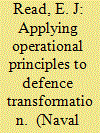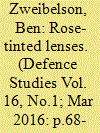|
|
|
Sort Order |
|
|
|
Items / Page
|
|
|
|
|
|
|
| Srl | Item |
| 1 |
ID:
128596


|
|
|
|
|
| Publication |
2013.
|
| Summary/Abstract |
In this article, the author examines General David Patraeus's counter-insurgency doctrine in Afghanistan as an example of change management and considers what might be learned about change management defence generally from it.
|
|
|
|
|
|
|
|
|
|
|
|
|
|
|
|
| 2 |
ID:
143611


|
|
|
|
|
| Summary/Abstract |
Strategists and military professionals have previously questioned many of the methodological (theoretical underpinnings, the principles, and rules applied by the discipline) decisions associated with American military strategy, but the direction this essay takes is above and beyond the common methodological rivalries in how we pursue strategic desired future states. To get beyond methodological disputes entirely, we must consider thinking about our thinking as an organization on American strategy. Thus, this article hovers between philosophies, organizational theory, as well as our usually unquestioned belief in something called “strategy”. Questioning things about our basic understanding of the world tends to trigger strong organizational defense mechanisms, for good reason. Critical reflection at deep levels puts our worldview, and our role within it at stake. Nonetheless, as strategic disappointment emerges over multiple complex conflict developments, even the most cherished and guarded choices on how the world ought to work are ripe for critical inquiry. This essay examines the limited single strategic paradigm of the US defense industry and how the latest American National Security Strategy and Army Future Operating Concept (Win in a Complex World through 2030) presents a flawed strategic position. This essay presents valid alternative strategies that operate within different paradigmatic constructs.
|
|
|
|
|
|
|
|
|
|
|
|
|
|
|
|
| 3 |
ID:
178264


|
|
|
|
|
| Summary/Abstract |
Between 2000 and 2008, Zimbabwe experienced debilitating economic, political and social problems. The crises were characterised by political unrest, economic downturn, hyperinflation, food insecurity, breakdown in the provision of basic social services and the intensification of the effects of global warming and climate change. The period saw the entry of many international non-governmental organisations (NGOs), including GOAL Zimbabwe, which came to deal with the unfolding humanitarian crisis. Key informant interviews were conducted with 21 interviewees from GOAL, Buhera Rural District Council officials, Agritex officers and project beneficiaries. Atlas Ti was used to analyse the data into key themes. In 2010, GOAL Zimbabwe chose to stay and reincarnate itself and went through a very difficult process from being a relief to a development organisation. Results show the process on which GOAL embarked in transitioning from relief to recovery. The evidence coming out of the discussions indicates that with the right levels of support from development partners and commitment by communities, it is possible for both organisations and communities to transition from a humanitarian and relief mindset to a development paradigm.
|
|
|
|
|
|
|
|
|
|
|
|
|
|
|
|
|
|
|
|
|